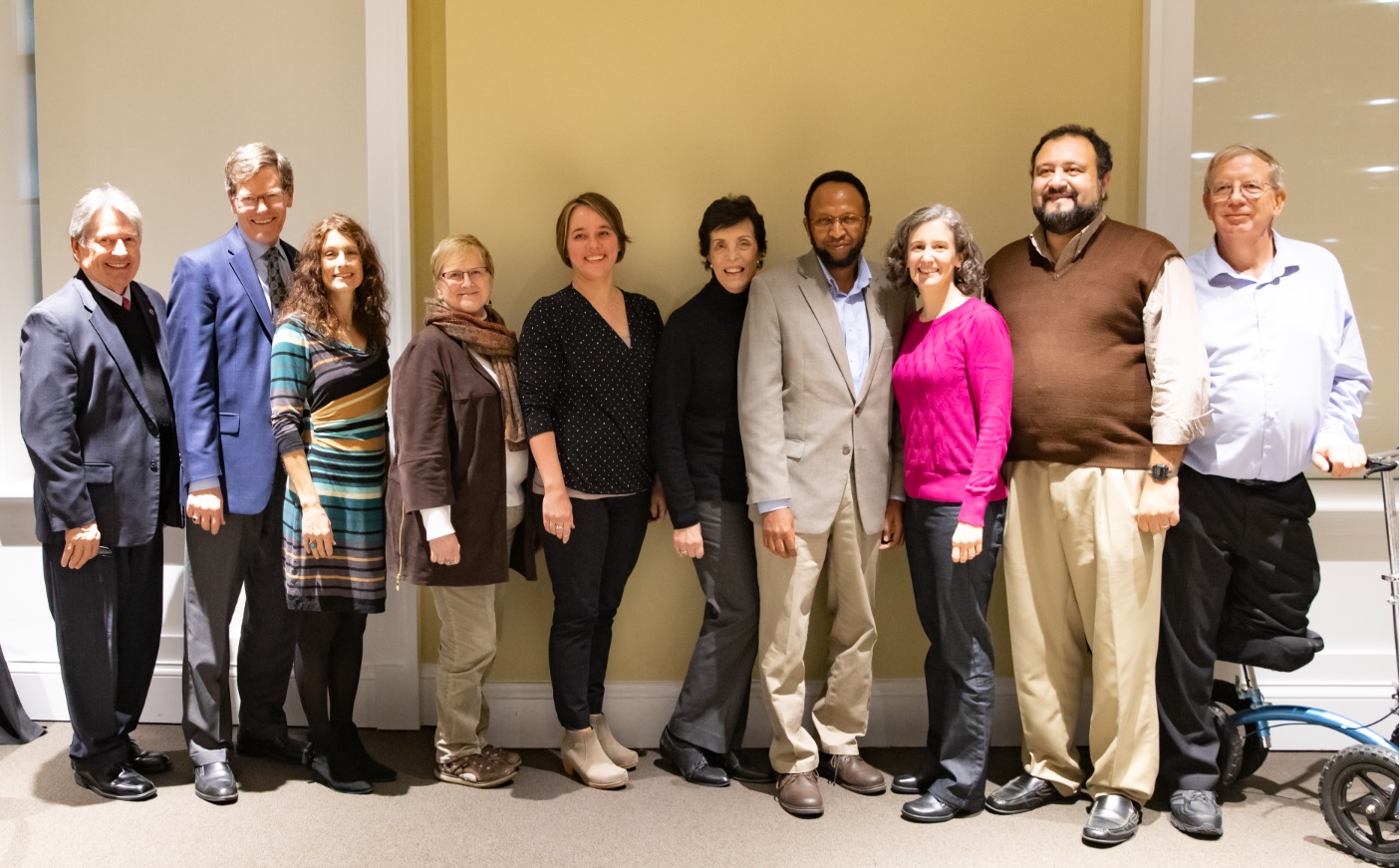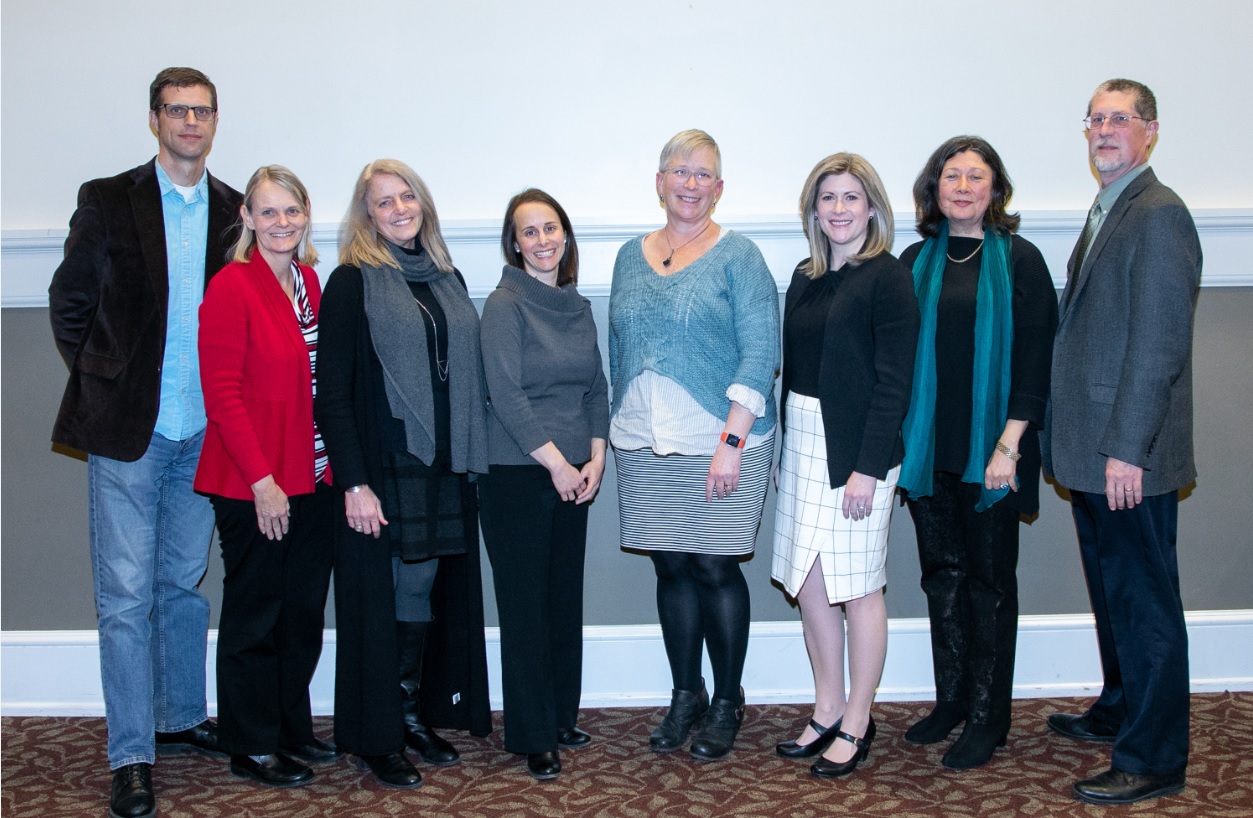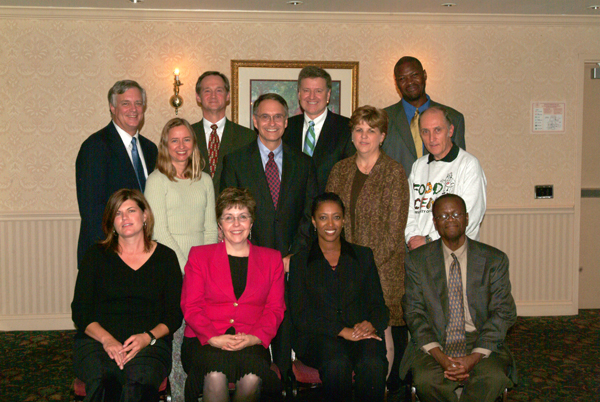Craig Wiegert, James Hamilton, Lance Palmer, Eddie Watson, and Brock Tessman
Members
Class of 2023
Jennifer Elkins, Jason Matthews, Erin Towery, Maric Boudreau, Kyle Woosnam, Michael Cotterell, Bridget Garner, Trisha Lewis Ellison, Nancee Reeves, Yoo-Kyoung Seock, Jillian Bohlen, Kerstin Emerson, Amy Medlock, Abigail Borron, Christa Capps, and Gino D'Angelo
Class of 2022
Steven Lewis, Paul Pollack, Jennifer Brown, Julie Stanton, Jennifer Walker, Amitabh Verma, Paul Matthews, Keith Dougherty, Jason Peake, Rebecca Matthew, Collette Chapman-Hilliard, Maryann Erigha, and William Hollingsworth)
Class of 2021
Kristina Jaskyte Bahr, Robert Bringolf, Victoria Hasko, Chris Hocking, James Lauderdale, Paula Lemons, Amy Pollard, Lori Ringhand, Kaori Sakamoto, Vera Lee-Schoenfeld, Sarah Shannon, Jo Smith, Shavannor Smith, David Spooner, Teena Wilhelm
Class of 2020
Lewis Howe, Kristin Kundert-Gibbs, Logan Sawyer, Nicholas Fuhrman, Puliyar MohanKumar, Christine Albright, Michael Cacciatore, Alex Reed, George Vellidis, Pete Bettinger, Leah Carmichael, Thomas Hagood, Ilse Mason
Class of 2019
(L-R) Josef Broder - Teaching Academy Chair, David Jackson, Melissa Landers-Potts, Stephanie Tingler, Anne Shaffer, Sylvia Giraudo, John Mativo, Kelly Dyer, Khaled Rasheed, and C. Robert Dove.
Class of 2018
(L-R): Michael Marshall, Kimberly Skobba, Laura Bierema, Melissa Fahmy, Trish Moore, Megan Mittelstadt, Katalin Medvedev, Mark Farmer, and Santanu Chatterjee (not pictured).
Class of 2016
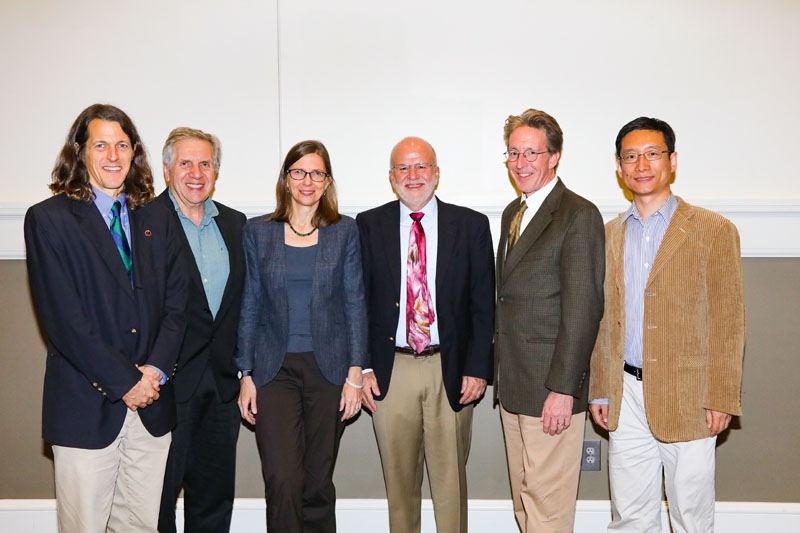
(L-R): James E. “Jeb” Byers, Joel M. Lee*, Karin Myhre, Galen L. Edwards, Ron Balthazor, Chanying “Charlie” Lee
Class of 2015

(Front L-R): Cynthia Ward, Dana Bultman, Tina Carpenter, Wesley Allen, Betsy Vonk, Stephanie Jones
Class of 2014
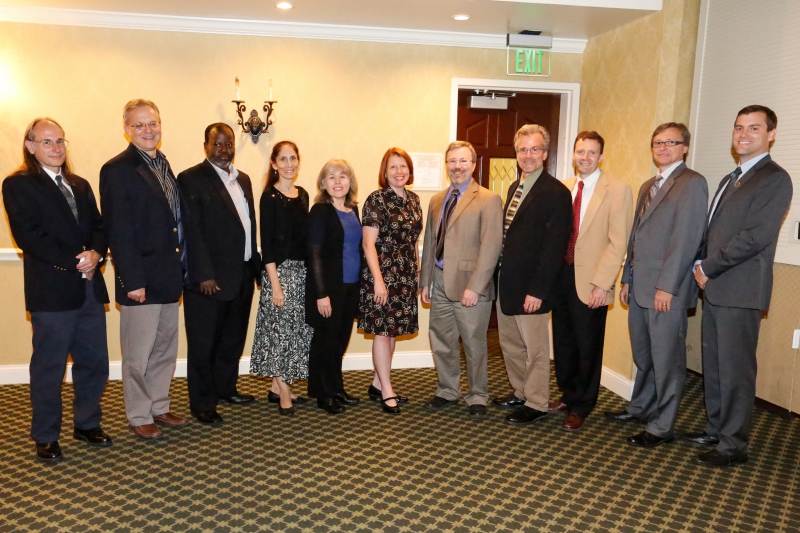
(L-R): Malcolm Adams, Markus Crepaz, Akinloye Ojo, Lisa Fusillo, Kathryn Roulston, Sherry Clouser,
Class of 2013
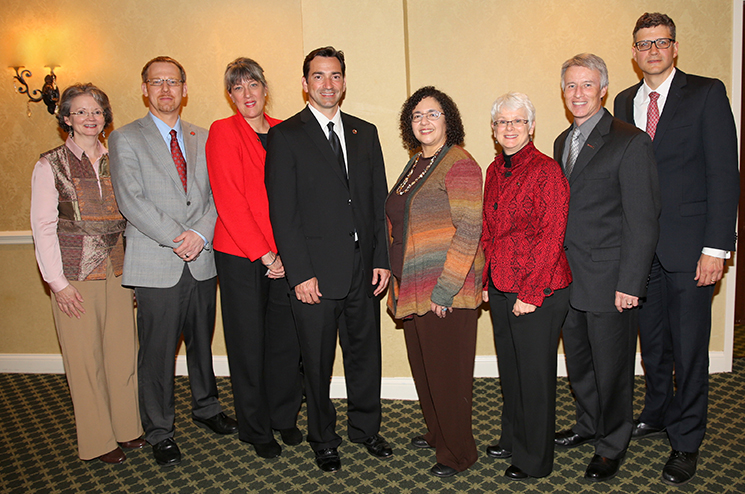
(L-R: standing): Anna Karls, Joseph Goetz, Barbara Biesecker, Alfred Vick, Caroline Medine, Marsha Black, Gary Green and Richard Menke
Class of 2012

L-R: standing): Mary Bedell, David Gattie, Mary Alice Smith, George Contini, James
Moore, Maria Navarro, Andrew Parks and Bill Vencill
(sitting): William Finlay, Patricia Richards,, Georgia Strange and Annette Poulsen

DeLoris Wenzel Hesse and Kirk Willis
Class of 2011
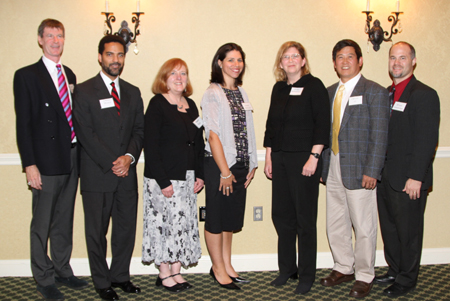
(L-R): Mark Cooney, Lonnie Brown, Elizabeth Kraft, Linda Renzulli
Erika Hermanowicz, Wan-I Oliver Li and Brian Cummings
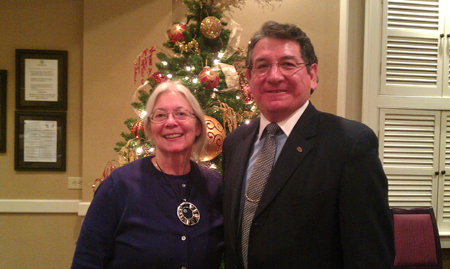
Kathleen de Marrais and Fausto Sarmiento
Class of 2010
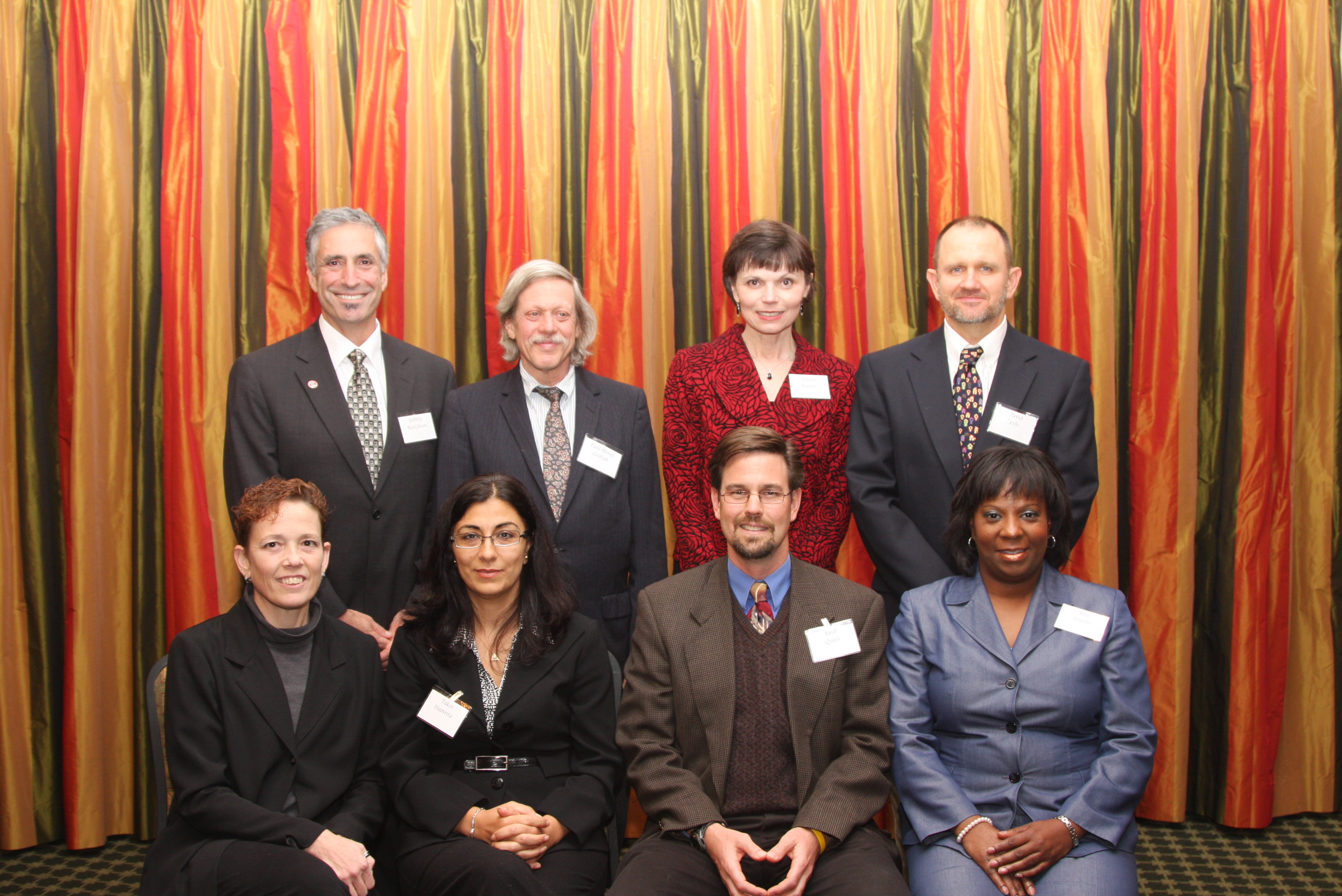
(L-R Back): Jeffrey Berejikian, Paul-Henri Gurian, Patricia Reeves, David Berle
(Front): Janette Hill, Takoi Hamrita, Paul Quick and Tina Harris
Class of 2009
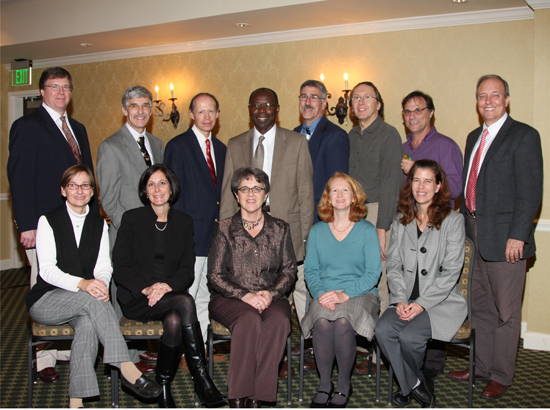
(L -R Back): Tim Foutz, Mark Compton, Michael Wetzstein, Kojo Mensa Wilmot,
Mike Azain, Robert Fecho, Scott Gold and Richard Morrison;
(Front): Audrey Haynes,Marisa Pagnattaro, Betty Jones, Jody Clay-Warner,
Melissa Harshman (not pictured: Robert Cooper)
M. Carolina Acosta-Alzuru, Journalism
P. Gayle Andrews, Elementary and Social Studies Education
Joel D. Black, Comparative Literature
Brenda J. Cude, Housing and Consumer Economics
Christine A. Franklin, Statistics
W. Dale Greene, Forestry and Natural Resources
Mark A. Harrison, Food Science
Patricia K. Hunt-Hurst, Textiles, Merchandising & Interiors
C. Rhett Jackson, Forestry and Natural Resources
Martin H. Kagel, Germanic and Slavic Languages
Naomi J. Norman, Classics
Ray Paolino, Drama and Theater
Brigitte Rossbacher, Germanic and Slavic Languages
David H. Zerkel, Music
Shelley E. Zuraw, Art History
Class of 2007
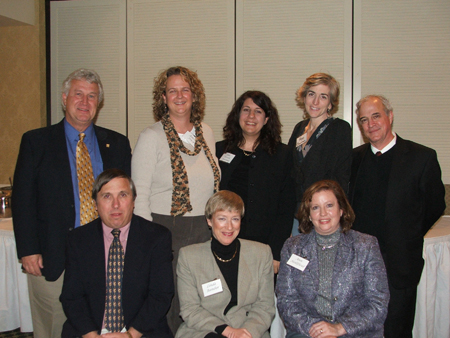
(L-R back row): Gregg Coyle, Janet Frick, Jodi Holschuh, Marguerite Brickman, and
Nelson Hilton.
(front row): Sid Thompson, Linda Bamber and Ann Hollifield. Not pictured: Margaret
Graham.
Linda S. Bamber, Accounting
"The most rewarding words I can hear from a student is that he or she has achieved and grown more than they would have believed possible. . . While I hold students tohigh standards, they know that I hold myself to equally high standards. For example, I not only learn studentsÕ names, but I also learn about their prior workexperiences, so I can illustrate the importance and/or practical application of thedayÕs topic in the context the individual studentÕs experiences."
Marguerite Brickman, Plant Biology
"After teaching at the college level for the past decade, I am just now becoming aneffective instructor. This is a humbling statement, and it should be. Admittingfailings and striving to improve are the essence of what makes a good teacher. It takes decades of trial and error, of justifying why students should spend their timelearning what you have to teach, and of critically questioning your effectivenessbefore it is possible to become a good teacher."
Gregg A. Coyle, Environmental Design
"The product of excellent teaching is an excellent student and beyond that anexcellent citizen. . . Teachers should act as an inspirational source directing studentsto take advantage of all the educational opportunities available in order to improvetheir chances of advancement. Teachers should also create opportunities andencourage students to capitalize upon given moments or tasks that potentially allowfor self success."
Janet E. Frick, Psychology
"Outstanding teaching, in my view, requires reflection more than anything else. It requires time and space and energy, much like academic writing. Outstandingteaching requires a deep knowledge of the subject, but that alone is insufficient. It also requires a passion for seeing students grapple with ideas, and for watchingthem be transformed by knowledge and growth. True teaching is transformative, both for the student and the instructor."
Margaret A. Graham, Language Education
"I believe in the power of an inquiry mindset and have introduced my students – bothpre-service and in-service – – to teacher research, exploring with them the value ofposing questions which grow from their own teaching practice and then identifyingways they might go about finding answers for themselves. Perhapssimply very good learners who adapt to change, assume multiple perspectives, andvalue constant inquiry."
H. Nelson Hilton, English
"Everyone should have the good fortune to spend life, or at least a goodly portion, incompany of the perfect teacher. Such an exemplar would be untiring, alwaysavailable, infinitely various, accessible, and profoundly engaging. The nature of that mentor will depend upon the student, of course, but I can say that upon firstencountering mine in high-school I felt with shock the presence of a profound butaccessible vision."
C. Ann Hollifield, Telecommunications
"I believe that the primary role of the teacher is to mentor the intellectual andprofessional development of students through effectively managing the classroomexperience. As a mentor, a professor is called upon to guide and advise students onthe best means to accomplish their personal goals, to support and encourage them intheir work, to cheer their successes and to tell them clearly when they have failed tomeet expectations."
Jodi P. Holschuh, Reading Education
"To me teaching is one of the great challenges in life. As a teacher I strive to help mystudents understand what it means to learn. . . I want students to see that learning isnot merely memorizing facts for an exam; instead learning can be a transformative process. In fact, I believe that each learning experience changes the learner in some way."
Sidney A. Thompson, Engineering
"For over 25 years, I have taught engineering courses at The University of Georgiaand
have always strived to create an environment that encourages students to thinkcritically
about their academic career and their professional career that enhancesprofessionalism
in the classroom and that makes the student appreciate the chance to learn."
Class of 2006
Charles H. Atwood, Chemistry
"Philosophically, I am interested in understanding what makes learning chemistry difficult and how to best assist students in improving their performance. I prefer to do this based upon strong statistical evidence and psychological understanding of student learning. While we are still early in our learning curve, it is clear that we are making significant inroads into understanding student performance in large classroom settings."
Karen K. Cornell, Veterinary Medicine
"My teaching philosophy is not complicated or profound. I feel strongly that students learn best by understanding a concept not memorizing a fact. As a teaching academician in veterinary medicine, I strive to have a lasting, positive impact on veterinary students. I want to be the voice inside their heads that encourages logical thinking and calm confidence when, after graduation, they perform a complicated surgical procedure for the first time."
Jolene R. Davis, Music
"During my 25 years of teaching, I have tried to emulate those great teachers who inspired me during my school years. I have been trying to discover how to move my children to a deeper understanding of the subject of music theory. Much of my “planning” time is spent visualizing the class and imagining new and creative ways of explaining difficult concepts. . . Most of all, enjoy the teaching experience. If I love what I do in class, then most of the students will understand the importance of the subject. Some will also come to love it."
John P. Dayton, Education
"A professor cannot simply assume that students will automatically share their love for the academic subject, or assume that the student will understand the importance of learning this knowledge. In an increasing hectic world, many things compete for our students’ time, attention and energy. Under these circumstances, it is essential that professors effectively explain to the students the significance of the subject they will be studying, and clearly demonstrate tostudents why learning this knowledge is worthy of investing their time, attention and best efforts."
Helen H. Epps, Textiles, Merchandising and Interiors
"I intentionally ask lots of questions in my classes. Some of my questions are very serious, some are very light and easily answered and some are very difficult . . .If students have no unanswered questions at the end of a class period, or at the end of the semester, or at the end of their college career, I will have failed to teach – failed both the student-learner, and myself, the teacher-learner. Regrettably, I frequently fail. But when I succeed in stimulating a thoughtful question or two, or on those rare occasions, when every answer stimulates multiple questions, I am confident that learning occurs."
Karl E. Espelie, Entomology
"One of my main goals in the classroom is to be able to treat each student as an individual. In a large classroom this is often a difficult task. At a large university, it is also difficult for a student to feel that they have the ability to succeed. I like to help students adapt to life at a large university. I serve as the academic advisor for a large number of students with a diversity of majors and a wide range of career goals. I always ask my advisees about their opinion of the courses that they take . . I make a point of asking my older advisees to provide advice to younger students."
Jack E. Fincham,Pharmacy
"In the rush of days, weeks, and years as an academic with attendant pressure and stress to excel as a scholar with overlapping faculty roles, it is so very easy for many of us to forget why we entered academia. Many of us are here because we wanted to teach, research, and share knowledge others. Often, the rewards for much of what we do daily may seem scant. However, our ability to influence students at an eager, formative stage is an awesome challenge with equally enriching rewards in scope and outcome."
Claiborne Van C. Glover, Biochemistry
"At its core, teaching is a formal extension of raising children. . .Whenever one is choosing what to teach the next generation, particularly when it touches on moral, political, or religious issues, there is always danger. My rule is this: if you would be a teacher, ask yourself, “Is it my ambition that my students should learn to think like me or that they should learn to think for themselves?” This is the crucial test, and it is harder than it may sound if you have any convictions at all, but it is the most important thing. It boils down to faith in the human mind and in the human heart, that given an environment of open inquiry and free expression, that our students – that our children – will chose wisely."
Edward C. Halper, Philosophy
"Learning is a transformation that does not become apparent to the learner until after it has been made. There are many reasons that students come to the University. A desire to learn is very rarely among them; so rarely that it can be discounted entirely. The task of a teacher is to provoke students to transform themselves by showing them exciting ideas and books. What makes the ideas exciting is that they are at once important and problematic. Students live between accepted truths and purely subjective feeling. They don’t see any space for thinking. They are facing the wrong direction, convinced that nothing lies behind them."
Juanita Johnson-Bailey, Education
"Teaching is a three-way interaction: the learners, the teacher, and the context all drive the process. Therefore, I never teach the same course the same way. So, whether I have a new course prep or not, I am always doing a new course prep. This is a necessity because there are always new readings to add and no new group of students is the same as the last. I find this process of continual revisions and uncertainty exhausting, but it is such an exciting and synergistic way to live. I cannot imagine doing it any other way for nothing makes me more anxious or happier than teaching."
David A. Knauft, Horticulture
"What does a successful graduate “look like” when they have been away from school for 5-10 years? . . they should be successful in their job, have the capacity for continued growth as a person and as an employee and they should be generally pleased with their quality of life. As I reflected on these issues, I realized there were “big things” that we needed to help our students understand, so that they could gain the “little things” on their own. These “big things” tend to be centered on human relations such as the ability to communicate, work together in teams, solve problems and continue learning."
Rodney Mauricio,Genetics
"Science is the ultimate in hands-on learning: every 3rd grader is a natural-born scientist with an insatiable curiosity about the world. How we as science educators can, in many cases, turn that innate curiosity off surprises me – but I regularly see us bludgeon curiosity and problem-solving out of students with lectures that focus on memorizing lengthy catalogs of facts. The lecture is here to stay in the 21st century university, but must it be so uninspiring? Science can be intimidating, but science classes need not be."
David E. Shipley,Law
"I learned from many outstanding teachers during my formal education. . . I had great teachers who lectured, great teachers who engaged their classes in lively discussions, and great teachers who challenged students through rigorous Socratic questioning. My best teachers . . . were enthusiastic about their subjects and were able to convey their enthusiasm to their students. They enjoyed being in the classroom. All had a sense of humor and could laugh at themselves, and they treated students with respect and showed that they wanted us to understand the material. . . they never made students feel that we were wasting their time. They put students first."
Chi N. Thai, Bio and Ag Engineering
"I do not consider that teaching and learning only occur inside the classroom, thus I reserve for the classroom, activities that require more “coaching” and more “interactions” between teacher/students and students/students, where as the content may be more “concentrated” in terms of quantity and speed. I also create other materials that student can access asynchronously on their own because this would be the “quiet” time for students to work on reinforcing their personal internal understanding linkages. . .thus, I come back full circle to student “motivation,” to a human dimension which reminds me not to be blinded by all of the glitters of technology."
J. Douglas Toma, Institute of Higher Education
"My teaching philosophy is straightforward. Fundamentally, in recognizing that students have different learning styles, I attempt to accommodate these while teaching, changing my approach and even my affect regularly to keep the attention of the group. The same is true of not only offering students theoretical models but also presenting multiple ones so individual students can discover those that resonate with them. I also introduce humor into my classes as often as possible, as I believe that relaxed students are more likely to master the material."
Class of 2005
(Left to right) front row: Michelle Ballif, Martha Thomas, Paige Carmichael, Wiliam
Kisaalita; second row: Sybilla Beckman, George Francisco, Karen Leonas, Rob Shewfelt;
back row: Tom Eaton, Mark Huber, Karl Kuhnert, Ron Walcott
Michelle Ballif, English
"I demand a high level of performance from my students in writing, reading and thinking. . . I teach my students that there are at least two sides – if not an infinite number of angles – from which to interpret texts and the world."
Sylvia Beckman-Kazez, Mathematics
"I was interested in mathematics research and, although I enjoyed my teaching and took it seriously, I didn’t think of it as scholarly work. But when I had children, and when my children started going to school, I began to think about the importance of teacher education."
Paige K. Carmichael, Veterinary Medicine
"The effectiveness of a teacher should not be measured just by the number of dollars in teaching grants she brings in, or the number of classes she teaches . . . but by the number of students she inspires in her life, and I hope to inspire many."
Thomas Eaton, Law
"If I had to reduce my teaching philosophy to a single word, it would be “engagement.” My goal is to engage students – to keep them actively thinking about the material and its applications. The tricky part is figuring out how to keep them engaged."
George E. Francisco, Pharmacy
"While students and new professors alike understand that learning content is paramount to the success in a course, it is the seasoned professor who understands that skills, abilities, and attitudes are of equal or greater importance in the student’s educational development."
Mark W. Huber, Management Information Systems
"I strive to create and maintain a personal commitment to creatively and energetically engage students in a manner that fosters their intellectual and personal growth . . . I stress interaction with students as adults, worthy of respect and valued for their ideas and aspirations."
William S. Kisaalita, Biological and Agricultural Engineering
"I want students to learn to make connections across disciplinary, national and cultural borders – today’s undergraduates will occupy workplaces and communities that have been transformed by globalization."
Karl W. Kuhnert, Psychology
". . . the most I can give a student is my love of wisdom. Appreciation for the complexity of truth arises from the personal pursuit and discovery of it. My philosophy of teaching is to develop that appreciation and to inspire the joy of the hunt."
Karen K. Leonas, Textiles, Merchandising and Interiors
"My underlying philosophy is to help the student learn to learn . . . Ultimately, my goal is to enable the student to internalize the goals of their education so that the need of external motivation is diminished."
Robert L. Shewfelt, Food Science and Technology
"If I am to have an impact on each of my students, I must be able to get into each of their minds . . . I try to seek out the gifted and the struggling students to learn of their needs and to simulate their interests."
Martha L. Thomas, Music
"I want my students to love music and to have the skills to continue learning after they leave the university setting. I hope that their music studies become a part of their lives and become something they will never lose."
Ronald W. Walcot, Plant Pathology
"Because good teaching is fundamental for introducing young people into disciplines critical for the advancement of society, teachers must make a personal commitment to excellence in instruction, even at the risk of no reward and sometimes, professional peril."
Class of 2004
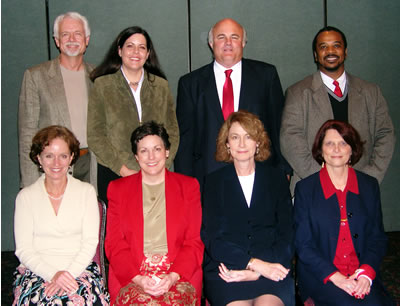
Back row (left to right): Ronald W. McClendon, Lynn A. Bryan, Timothy J. Smalley, Gregory S. Broughton; Not pictured: David C. Hazinski
Class of 2003
Scott A. Brown, Veterinary Medicine
"I make efforts to understand the challenges they face; I believe that most of my students know and appreciate that I care deeply about their performance in class today, on the exam next week, and in life long after my class is over."
John P. Dattilo, Recreation and Leisure Studies
"My philosophy of teaching is based on the premise that each student is to be appreciated for their unique perspective and their ability to contribute to the learning environment; therefore, each individual is to be respected and treated with dignity."
John A. Maltese, Political Science
"I set very high standards in the class, but in doing so I try to convey a sense of enthusiasm for the subject matter and instill the notion that wide ranging interests – including politics – make life exciting."
Thomas W. McCutchen, Music
"My goal for each of my students is to help them learn the skills necessary to be successful in life, not just music."
R. Baxter Miller, African American Studies
"By helping undergraduates–graduates are even a higher challenge of a more professional kind–become highly analytical during their emotional, religious, and patriotic fervor, I help them redirect blind beliefs in traditional forms into brave new theories of flexible freedoms."
David H. Newman, Forest Resources
"I have often felt like a pilgrim in my teaching. I have grown to appreciate the importance of getting students to think about issues in ways that may be foreign to their normal thought processes and observing the times when a spark is set."
Stephen F. Olejnik, Educational Psychology
"While my primary objectives are to teach the tools of science and to help students develop the skills needed to complete their research degree requirements, my secondary objectives are to increase interest in the research process and to motivate and excite the students on the potential and rewards of new discoveries and understandings through research."
William L. Power, Religion
". . . the aims of education involve forming and reforming human beings in order to live knowledgeably, virtuously, productively, and abundantly in a world that contains both good and evil."
Lloyd P. Rieber, Instructional Technology
"I believe that learning is rooted in experience and in meaningful activities. Explanations are important of course, but I feel their relevancy and usefulness hinge on the degree to which a person can relate the explanation to a personal experience."
Hugh M. Ruppersburg, English
"My aim in the class room can be summed up with an oft-cited motto from E. M. Forster’s novel, Howard’s End: “Only Connect” . . . . In my classes I work to make personal connections with students, and encourage them to connect directly with the subjects we study."
Kathleen B. Smith, Instructional Support and Development
"To teach well we must not teach in isolation from our peers or from our students. The process of teaching and learning must be collaborative between teacher and student, with students taking much of the lead in applying knowledge to practice."
Class of 2002
Thomas G. Dyer
Higher Education and History
Noel Fallows
Romance Languages
Marcus Fechheimer
Cellular Biology
John C. Inscoe
History
Pamela B. Kleiber
Honors Program
Denise S. Mewborn
Mathematics Education
Rosemary E. Phelps
Counseling and Human Development
Thomas C. Reeves
Instructional Technology
Robert A. Scott
Chemistry
Deborah J. Tippins
Science Education
Scott S. Weinberg
Environmental Design
Class of 2001
- Gilles O. Allard, Geology
- Jo Beth Allen, Language Education
- Ileana Arais, Psychology
- Joseph Berrigan, History
- Robert G. Boehmer, Insurance/Real Estate/LegalStudies
- Robert D. Brussack, Law
- Joan M. Buttram, Dance
- James E. Coverdill, Sociology
- Christy Desmet, English
- Fredric T. Dolezal, English
- Peter Dress, Forest Resources
- Michael A. Duncan, Chemistry
- Anne P. Dupre, Law
- Richard A. Fayrer-Hosken, Large Animal Medicine
- William P. Flatt, Animal & DAiry Science
- Jerry E. Gale, Child & Family Development
- Thomas W. Ganschow, History
- Craig E. Greene, Small Animal Medicine
- David Haas, Music
- David M. Hayes, Health Promotion & Behavior
- Carole K. Henry, Art
- Andrew J. Herod, Geography
- Richard K. Hill, Chemistry
- Will F. Holmes, History
- Robert E. Hoyt, Insurance/Real Estate/ Legal Studies
- Charles M. Hudson, Anthropology
- Peter A. Jorgensen, Germanic & Slavic Languages
- Karen W. King, Advertising & Public Relations
- Katherine Kipp, Psychology
- Peggy J. Kreshel, Advertising & Public Relations
- Nancy P. Kropf, Social Work
- Edward J Larson, History
- Lettie L. Lockhart, Social Work
- Tricia A. Lootens, English
- Jean F. Martin, Music
- Velma McBride Murry, Child & Family Development
- Charles Y. McCall, Clinical & Administrative Services
- Barbara McCaskill, English
- Jennifer L. Monahan, Speech Communication
- Genelle G. Morain, Language Education
- Jere W. Morehead, Insurance/Real Estate/Legal Studies
- Lioba Moshi, Comparative Literature
- Larry G. Nackerud, Social Work
- Elizabeth Pate, Elementary Education
- Theresa A. Perenich, Textiles, Merchandising & Interiors
- Matthew Perri, III, Pharmacy Care Administration
- James A. Pippin, Social Work
- Sharon Price, Child & Family Development
- Paul T. Purinton, Anatomy & Radiology
- Diana L. Ranson, Romance Languages
- Jay W. Rojewski, Vocational Education
- Lynne M. Sallot, Advertising & Public Relations
- Scott A. Shamp, Telecommunications
- Gladys G. Shelton, Housing & Consumer Economics
- Janice C. Simon, Art
- Michael A. Tarrant, Recreation and Leisure Studies
- Kacia M. Thomas, Psychology
- Steven C. Turner, Agricultural & Applied Economics
- Brahm P. Verma, Biological & Agricultural Engineering
- Charlotte R. Wallings, Child & Family Development
- Susan L. White, Large Animal Medicine
- Betty J. Whitten, Insurance/Real Estate/ Legal Studies
- David S. Williams, Religion
- Lisa H. Williamson, Large Animal Medicine
Inaugural Class of 2000
- Donna E. Alvermann Reading Education
- Stanley V. Longman Drama & Theatre
- Paul W. Ammons Social Work
- Brenda H. Manning Teacher Education
- James C. Anderson Classics
- Robert W. Matthews Entomology
- Wyatt W. Anderson Arts and Sciences
- Hubert W. McAlexander, Jr. English
- William E. Barstow Biological Sciences
- Patrick G. McKeown Management & Information Systems
- Michelle Henry Barton Large Animal Medicine
- Linda Medleau Small Animal Medicine
- Ronald L. Bogue Comparative Literature
- Sharan B. Merriam Leadership & Lifelong Learning
- Karen S. Calhoun Psychology
- Charles W. Mims Plant Pathology
- Nancy L. Canolty Food and Nutrition
- Sherrie Nist Academic Assistance
- Dan T. Coenen School of Law
- Clifton W. Pannell Arts & Sciences
- Walter M. Darley Biological Sciences
- Sylvia J. Pannell Drama & Theatre
- Delmer D. Dunn Political Science
- William G. Provost English
- C. Ronald Ellington School of Law
- Judith C. Reiff Teacher Education
- Conrad C. Fink Journalism & Mass Communications
- Dean G. Rojek Sociology
- Denise Muth Glynn Teacher Education
- Theodore Shifrin Mathematics
- Shawn M. Glynn Professional Studies
- Michele L. Simpson
- Academic Assistance Frank R. Harrison, III
- Philosophy Ronald D. Simpson
- Institute of Higher Education
- Larry L. Hatfield Teacher Education
- Anne L. Sweaney Housing & Consumer Economics
- Elissa R. Henken English
- A. Thomas Taylor Pharmacy
- Loch K. Johnson Political Science
- Frances N. Teague English
- Mary Ann Johnson Food & Nutrition
- Roger K. Thomas Psychology
- Keith J. Karnok Crop & Soil Sciences
- Glenn O. Ware Forest Resources
- Marguerite Koepke Environmental Design
- Robert J. Warren Forest Resources
- Dean M. Krugman Journalism & Mass Communications
- Allen G. Webb, Jr. School of Art
- Charles R. Kutal Chemistry
- Fred C. White Agricultural & Applied Economics
- David P. Landau Physics & Astronomy
- Rebecca Hanner White School of Law
Charter Members
Robert L. Anderson
Physics
Jeanne A. Barsanti
Veterinary Medicine
Josef M. Broder
Agricultural & Applied Economics
Ronald L. Carlson
Law
Joe W. Crim
Cellular Biology
Sylvia M. Hutchinson
Higher Education
William K. Jackson
Instructional Support & Development
Patricia L. Kalivoda
Instructional Support & Development
Jeremy Kilpatrick
Math Education
Patricia Bell-Scott
Child and Family Development and Women’s Studies
Peter J. Shedd
Business Law
Frederick J. Stephenson
Marketing
Susette M. Talarico
Political Science

